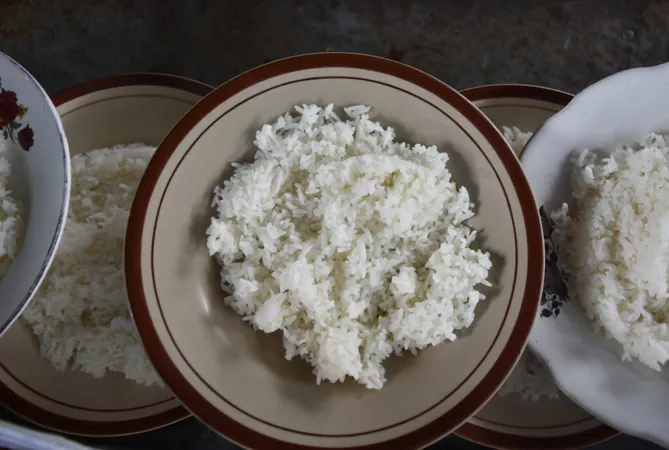
A Looming Crisis: Climate Change Makes Rice Toxic for Billions
2025-04-16
Author: Sarah
The World’s Staple Crop Faces a Toxic Future
Rice, the most consumed grain globally, is on the brink of becoming increasingly dangerous due to climate change. A groundbreaking study published in *The Lancet* warns that rising temperatures and increased carbon dioxide levels could expose billions to toxic risks, potentially leading to cancers and other serious health issues.
Rice: A Vital Food Source
With half the world's population relying on rice for their daily sustenance—especially in developing nations—it's crucial to address its safety. The way rice is cultivated, primarily in submerged paddies, allows it to absorb harmful substances like arsenic, a known carcinogen, particularly hazardous for infants.
Innovative Research Unveils Alarming Findings
Lewis Ziska, a plant physiologist from Columbia University, has dedicated 30 years to studying rice. Recently, he collaborated with researchers from China and the U.S. to examine the dual impact of rising carbon dioxide and temperature on rice plants. The results of their extensive research, which has never been attempted before on such a scale, shocked even the researchers themselves. As both CO2 and temperature escalated, so did the arsenic levels in rice grains.
The Toxic Absorption Process
Rice’s unique growing conditions contribute to its arsenic absorption. When fields are flooded, the rice plants absorb the water along with everything dissolved in it, including arsenic from the soil and water sources. The new research indicates that, due to complex chemical interactions in the soil, higher temperatures and CO2 levels will significantly increase the presence of inorganic arsenic—the most dangerous type.
Health Risks From Inorganic Arsenic
The health implications of consuming rice with elevated arsenic levels are staggering. Exposure to inorganic arsenic has been linked to various cancers, heart diseases, and neurological disorders in infants. This alarming finding is particularly relevant for populations in rice-heavy countries like Vietnam, India, and China, where the risk of disease is projected to rise drastically.
A Call for Urgent Action
Researchers emphasize the necessity for stricter regulations on arsenic levels in food, especially for vulnerable populations like infants, who consume large amounts of rice. Historically, the U.S. FDA has not implemented limits on arsenic in foods, highlighting an urgent need for policy reform based on these findings.
Innovative Solutions to Combat the Threat
Ziska and his team suggest proactive measures to minimize arsenic exposure, including developing rice strains that absorb less arsenic and educating consumers about alternative grains. Keeve Nachman, another researcher, stresses that slowing climate change should be a top priority to mitigate these risks.
Conclusion: A Global Challenge
The looming crisis around rice toxicity underscores a broader issue of food safety in the face of climate change. As millions depend on this vital crop, the intersection of environmental health and food security must be addressed promptly to protect the health of billions.


 Brasil (PT)
Brasil (PT)
 Canada (EN)
Canada (EN)
 Chile (ES)
Chile (ES)
 Česko (CS)
Česko (CS)
 대한민국 (KO)
대한민국 (KO)
 España (ES)
España (ES)
 France (FR)
France (FR)
 Hong Kong (EN)
Hong Kong (EN)
 Italia (IT)
Italia (IT)
 日本 (JA)
日本 (JA)
 Magyarország (HU)
Magyarország (HU)
 Norge (NO)
Norge (NO)
 Polska (PL)
Polska (PL)
 Schweiz (DE)
Schweiz (DE)
 Singapore (EN)
Singapore (EN)
 Sverige (SV)
Sverige (SV)
 Suomi (FI)
Suomi (FI)
 Türkiye (TR)
Türkiye (TR)
 الإمارات العربية المتحدة (AR)
الإمارات العربية المتحدة (AR)